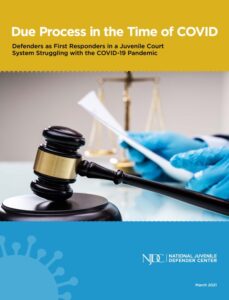Due Process in the Time of COVID: Defenders as First Responders in a Juvenile Court System Struggling with the COVID-19 Pandemic
In February and March 2020, as COVID-19 spread throughout the United States, NJDC recognized a crisis facing youth involved in the juvenile courts and the attorneys tasked with defending them. The contagious nature of COVID-19 and the public health protocols meant to mitigate transmission heightened risks to the health and wellbeing of youth entering the juvenile delinquency system, where placement in secure and nonsecure residential institutions is an ever-present threat.
Although the impact of COVID-19 on children can be different than on adults, it can still be severe,1 particularly for youth with pre-existing conditions.2 One in three youth hospitalized for COVID-19 were in the ICU, with Latinx and Black youth more likely to have COVID-19-associated hospitalizations than other youth.3 Given numerous reports of COVID-19 outbreaks in locked facilities for court-involved youth,4 the dire situation of many young people involved in the delinquency system has made the role of defenders in protecting their rights and liberty interests more critical than ever.
Recognizing the challenges attorneys have faced representing youth in the delinquency system during a pandemic, NJDC set out to investigate the impact of the COVID-19 pandemic on juvenile defense attorneys and their clients. Drawing from our network of defenders across the country, we interviewed 51 juvenile defenders from 38 states during June, July, and August 2020, inquiring about the health and safety risks defenders and their clients faced, and about how the pandemic was impacting their ability to provide effective legal representation for their clients.

